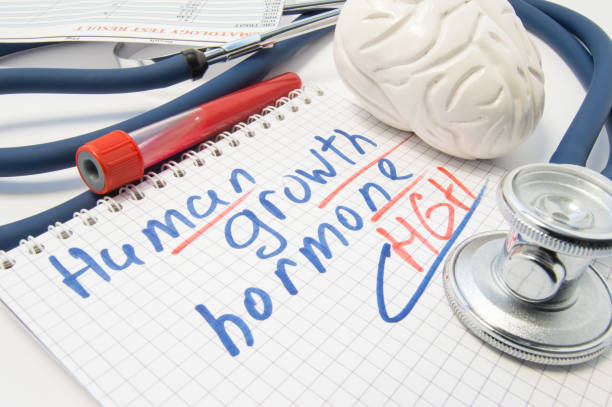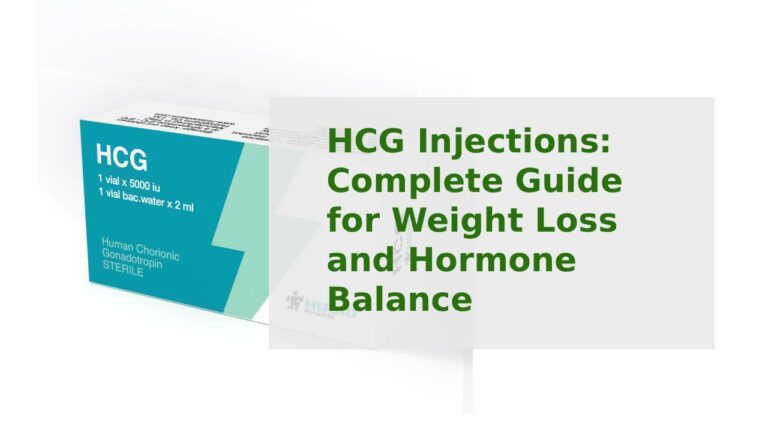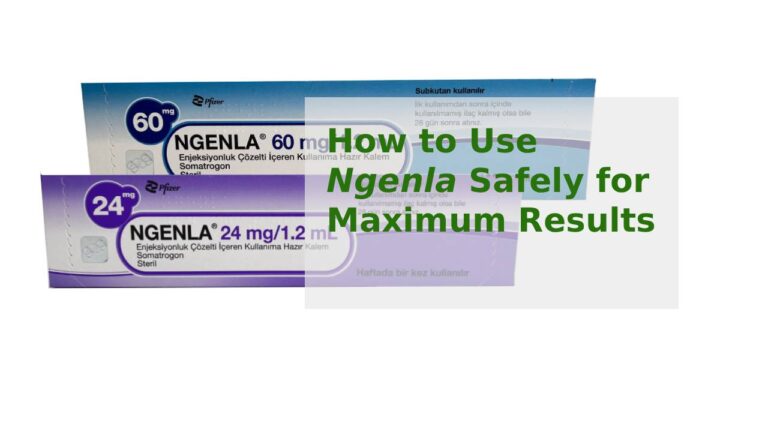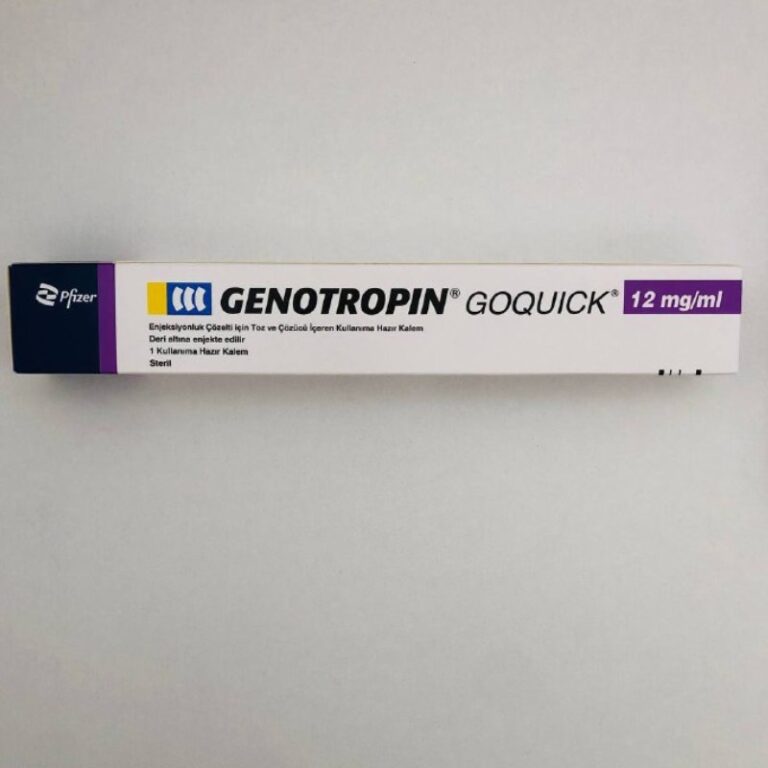- Why HGH and Weight Loss Are Connected
- What Is Human Growth Hormone (HGH)?
- The Science of HGH and Fat Metabolism
- Clinical Studies on HGH and Weight Loss
- HGH vs. Diet and Exercise Alone
- HGH and Insulin Sensitivity
- Benefits of HGH for Weight Management
- Medical Use of Pfizer Genotropin Pen
- Risks and Side Effects of HGH
- Who Should Consider HGH Therapy?
- Buying HGH Safely Online
- Real-World Success Stories
- FAQs About HGH and Weight Loss
- Conclusion
Why HGH and Weight Loss Are Connected
For decades, scientists, athletes, and everyday people have been fascinated by the potential of human growth hormone (HGH) to influence metabolism, muscle growth, and fat loss. Once thought of mainly as a hormone for children’s growth, HGH is now recognized as a key regulator of body composition and energy balance in adults.
With the rise of obesity, metabolic disorders, and age-related weight gain, many people wonder:
- Can HGH really help burn fat?
- Does HGH boost metabolism?
- What role does medical HGH therapy, such as the Pfizer Genotropin Pen, play in weight management?
This article provides a science-backed deep dive into HGH and its role in metabolism and fat loss. We’ll explore clinical studies, mechanisms of action, benefits, risks, and practical guidance for those considering HGH therapy.
👉 If you’re looking for a trusted HGH option, check out the Genotropin HGH Pen by Pfizer.
What Is Human Growth Hormone (HGH)?
Human Growth Hormone (HGH), also known as somatotropin, is a peptide hormone secreted by the pituitary gland in the brain.
Its functions extend far beyond childhood growth:
- Stimulates cell regeneration and tissue repair
- Regulates fat and carbohydrate metabolism
- Supports bone density and muscle mass
- Influences sleep, mood, and recovery
Natural HGH levels peak during puberty and decline steadily after age 30. This decline is often associated with:
- Increased belly fat
- Reduced muscle tone
- Slower metabolism
- Lower energy and vitality
This explains why HGH has become popular in age management and weight loss therapies.
The Science of HGH and Fat Metabolism
HGH affects lipolysis—the breakdown of fat stores into free fatty acids. When HGH levels rise, the body is signaled to use fat as fuel.
Key mechanisms include:
- Activation of Hormone-Sensitive Lipase (HSL) – the enzyme responsible for mobilizing fat from adipose tissue.
- Reduced Lipogenesis – HGH decreases the creation of new fat cells.
- Shift in Energy Use – instead of burning carbohydrates first, the body relies more on fat oxidation.
📌 This means HGH can reprogram metabolism to favor fat burning, making it particularly relevant for weight loss.
Clinical Studies on HGH and Weight Loss
Several landmark studies have demonstrated HGH’s impact on body composition:
- New England Journal of Medicine (1990s): Men receiving HGH injections lost significant fat mass while gaining lean muscle, even without changes in diet.
- Journal of Clinical Endocrinology: Overweight adults treated with HGH saw reductions in visceral abdominal fat—the type linked to heart disease and diabetes.
- European Journal of Endocrinology: HGH therapy improved lipid metabolism, lowering cholesterol and triglyceride levels.
These studies confirm that HGH doesn’t just support growth—it plays a direct role in fat reduction and metabolic regulation.
HGH vs. Diet and Exercise Alone
Traditional weight loss strategies—diet and exercise—are effective but limited. Here’s how HGH compares:
| Approach | Strengths | Weaknesses |
|---|---|---|
| Dieting (Calorie Deficit) | Reduces fat storage, easy to implement | May lead to muscle loss, slowed metabolism |
| Exercise (Cardio/Strength) | Builds lean mass, improves health markers | Requires consistency, results can plateau |
| HGH Therapy | Preserves muscle, accelerates fat loss, boosts metabolism | Requires medical supervision, potential side effects |
💡 Best practice: Combine HGH therapy + diet + exercise for sustainable results.
HGH and Insulin Sensitivity
Metabolism is closely tied to insulin function. Poor insulin sensitivity leads to fat storage, especially around the belly.
HGH can:
- Improve insulin sensitivity in people with HGH deficiency
- Support better glucose metabolism
- Reduce risks associated with metabolic syndrome
However, excess HGH can have the opposite effect, reducing insulin sensitivity. That’s why dosage and medical oversight are crucial.
Benefits of HGH for Weight Management
When used under medical guidance, HGH therapy provides multiple benefits:
✅ Fat Reduction – especially visceral fat around organs
✅ Preservation of Lean Mass – helps maintain muscle while losing fat
✅ Boosted Metabolism – increased calorie burn at rest
✅ Enhanced Energy – higher vitality improves training consistency
✅ Better Sleep & Recovery – improved rest leads to better weight loss outcomes
Many patients report not only weight loss but also an improved sense of well-being.
Medical Use of Pfizer Genotropin Pen
The Pfizer Genotropin HGH Pen is one of the most trusted HGH delivery systems worldwide. It’s FDA-approved for:
- Growth hormone deficiency in adults and children
- Turner syndrome
- Chronic kidney disease growth issues
- Muscle wasting disorders
Off-label, many physicians prescribe it for:
- Age-related hormone decline
- Weight management
- Anti-aging therapies
👉 Safe source: Genotropin HGH Pen by Pfizer.
Risks and Side Effects of HGH
While HGH offers benefits, it’s not risk-free. Potential side effects include:
- Water retention and swelling
- Carpal tunnel syndrome
- Joint or muscle pain
- Increased blood sugar
- Headaches
Long-term unsupervised use can lead to acromegaly (enlarged hands, feet, jaw) or worsen diabetes.
⚠️ Always use HGH under medical guidance to minimize risks.
Who Should Consider HGH Therapy?
HGH therapy may be appropriate for:
- Adults with clinically low HGH levels
- Middle-aged individuals with slow metabolism and fat gain
- People struggling with belly fat despite healthy lifestyle
- Patients with muscle loss due to illness
It’s not recommended for:
- Healthy young athletes seeking performance only
- Individuals with active cancer or uncontrolled diabetes
Buying HGH Safely Online
The HGH market is full of counterfeits. To ensure safety:
- Buy only from licensed providers
- Verify manufacturer seals and batch numbers
- Avoid “cheap HGH” offers—they’re usually fake
- Stick with brands like Pfizer (Genotropin), Novo Nordisk (Norditropin), Merck (Saizen)
👉 Recommended: Pfizer Genotropin HGH Pen.
Real-World Success Stories
Patients on HGH therapy often report:
- 5–15% body fat reduction in 3–6 months
- Improved muscle tone and energy
- Better exercise performance
- Enhanced motivation and recovery
While results vary, the consistent pattern is leaner body composition and higher metabolism.
FAQs About HGH and Weight Loss
Q: Can HGH replace diet and exercise?
A: No. HGH supports weight loss but works best alongside lifestyle changes.
Q: How long before I see results?
A: Most people notice fat loss and improved energy within 8–12 weeks.
Q: Is HGH safe for women?
A: Yes, when prescribed. Women often use HGH for fat loss and anti-aging with excellent results.
Q: Can I buy HGH without a prescription?
A: In the U.S., HGH requires a prescription. Buying without medical supervision is risky.
Conclusion
Human Growth Hormone plays a pivotal role in weight loss and metabolism. By enhancing fat breakdown, supporting lean muscle, and boosting energy, HGH can help individuals struggling with stubborn fat or age-related metabolic slowdown.
While not a magic cure, HGH therapy—especially with trusted products like the Pfizer Genotropin Pen—offers a scientifically supported path to improved body composition and metabolic health.
👉 Learn more and explore authentic HGH options here: Genotropin HGH Pen by Pfizer.




